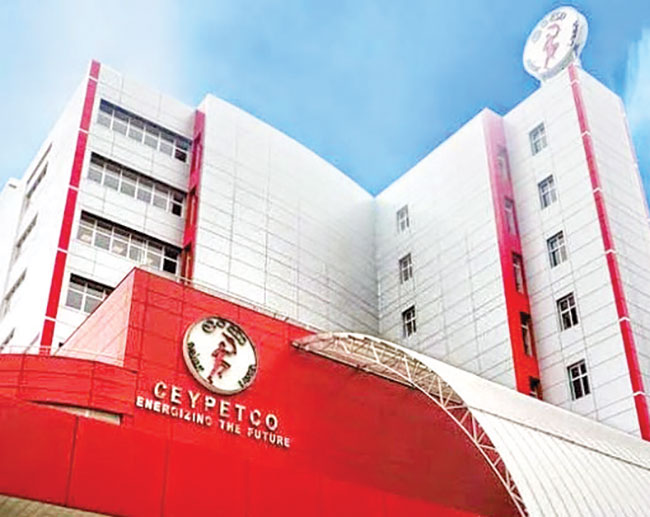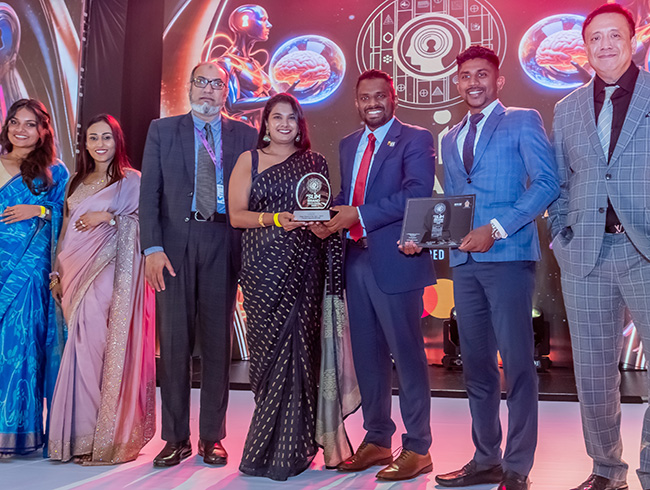Business
Losses incurred by energy utilities threaten stability of banks : Advocata

“The losses incurred by energy utilities have been financed by the state banks and have grown so large they now threaten the stability of the banks. The total liabilities owed by the state-owned monopoly, the CPC (Ceylon Petroleum Corporation) to the country’s two state banks, is a staggering Rs. 707,505 million ( USD3.5 billion) by the end of July 2021. Ensuring energy prices are no longer subsidised will reduce further debt accumulation by the state banks,” a press statement issued by Advocata Institute on Saturday said.
Elaborating on the situation Advocata said:
“Sri Lanka pitches into darkness and its people form lines at fuel stations due to the ongoing energy crisis. Fuel, which is the single largest import accounting for 18% of the country’s total import expenditure, cost an alarming USD 3.7 billion in 2021.”
“Since the actual cost of petrol and diesel is significantly higher than the current selling price, it promotes excessive consumption. This is in direct contradiction to the government’s other policies that are aimed at reducing imports.”
“Although there have been some increases in fuel prices recently, they are inadequate. Sri Lanka continues to sell fuel at a significant loss. Diesel is sold at a loss of LKR 46.80, while petrol is sold at a loss of LKR 18.37. Sri Lanka’s price of fuel is also below its neighbours. The selling price of petrol in India is about LKR 259.44, while diesel is about LKR 235.8. The selling price of petrol in Bangladesh is about LKR 202 while diesel sells at about LKR 188.23. Fuel, therefore, continues to be underpriced, highlighting a serious structural flaw in Sri Lanka’s fuel pricing mechanism.”
“Therefore a sharp increase in fuel prices is now unavoidable to prevent destabilising the financial sector and to prevent shortages of fuel supplies. Unless the root causes of the problem are addressed and the interest rates, foreign exchange rates and other key prices within the economy are allowed to be determined by market forces these imbalances will continue to recur.”
“Providing fuel subsidies also disincentives fuel efficiency. According to World Bank estimates the top 30% of society consume an overwhelming 70% of fuel sold in the country. There is little economic sense in channelling public funds to subsidise the relatively well-off segments of society. A direct cash transfer program targeted at vulnerable households requires far fewer funds and will address the needs of poorer segments of society. This will require a re-examination of the Samurdhi scheme.”
“Another key reform should include eliminating the barriers to entry to Sri Lanka’s energy sector. Enhancing competition by allowing more players to operate in the market is the only means of achieving both stable supply and stable prices in the long term.”
“Instead of continuing with the general subsidy, the government should consider introducing a market-driven pricing formula to determine prices at the pump. Immediate and urgent measures to bring about macroeconomic stabilisation needs to complement these reforms if the country is to come out of this difficult situation,” Advocata said.
Business
Sri Lanka betting its tourism future on cold, hard numbers

National Airport Exit Survey tells quite a story
Australia’s role here is strategic, not charitable
In a quiet but significant shift, Sri Lanka’s tourism sector is moving beyond traditional destination marketing and instinct-based planning. The recent launch of the “From Data to Decisions” initiative jointly backed by Australia’s Market Development Facility and the Sri Lanka Tourism Development Authority, sent an unambiguous message: sentiment is out, statistics are in.
The initiative is anchored by a 12-month National Airport Exit Survey, a trove of data covering 16,000 travellers. The findings sketch a new traveller profile: nearly half are young (20–35), independent, and book online. Galle, Ella, and Sigiriya are the hotspots; women travellers outnumber men; and a promising 45% plan to return. This isn’t just trivia. It’s a strategic blueprint. If Sri Lanka Tourism listens, it can tailor everything from infrastructure to marketing, moving from guesswork to precision.
The keynote speaker, Deputy Minister Prof. Ruwan Ranasinghe called data “a vital pillar of tourism transformation.” Yet the unspoken truth is that Sri Lanka has long relied on generic appeals -beaches, heritage, smiles. In today’s crowded market, that’s no longer enough. As SLTDA Chairman Buddhika Hewawasam noted, this partnership is about “elevating how we collect, analyse, and use data.”
Australia’s role here is strategic, not charitable. By funding research and advocating for a Tourism Satellite Account, it is helping Sri Lanka build a tourism sector that is both sustainable and measurable. Australian High Commissioner Matthew Duckworth linked this support to “global standards of environmental protection” – a clear nod to the growing demand for green travel. This isn’t just aid; it’s influence through insight.
“The real test lies ahead,” a tourism expert told The Island. “Data is only as good as the decisions it drives. Will these insights overcome bureaucratic inertia? Will marketing budgets actually follow the evidence toward younger, independent, female travellers?,” he asked.
“The comprehensive report promised for early 2026 must move swiftly from recommendation to action. In an era where destinations are discovered on Instagram and planned with algorithms, intuition alone is a high-stakes gamble. This forum made one thing clear: Sri Lanka is finally building its future on what visitors actually do – not just what we hope they’ll do. The numbers are in. Now, the industry must dare to follow them,” he said.
By Sanath Nanayakkare
Business
New ATA Chair champions Asia’s small tea farmers, unveils ambitious agenda

In his inaugural address as the new Chairman of the Asia Tea Alliance (ATA), Nimal Udugampola placed the region’s millions of smallholders at the core of the global tea industry’s future, asserting they are the “indispensable engine” of a sector that produces over 90% of the world’s tea.
Udugampola, who is also Chairman of Sri Lanka’s Tea Smallholdings Development Authority, used his speech at the 6th ATA Summit held in Colombo on Nov. 27 to declare that the prosperity of Asian tea is “entirely contingent” on the resilience of its small-scale farmers, who have historically been overlooked by premium global markets.
“In Sri Lanka, smallholders account for over 75% of our national production. Across Asia, millions of families maintain the quality and character of our regional teas,” he stated, accepting the chairmanship for the 2025-2027 term.
To empower this vital community, Udugampola unveiled a vision focused on Sustainability, Equity, and Digital Transformation. The strategic agenda includes:
Climate Resilience: Promoting climate-smart agriculture and regenerative farming to protect smallholdings from environmental disruption.
Digital Equity: Leveraging technology like blockchain to create farm-to-cup traceability, connecting smallholders directly with premium consumers and ensuring fair value.
Market Expansion: Driving innovation in tea products and marketing to attract younger consumers and enter non-traditional markets.
Standard Harmonization: Establishing common regional quality and sustainability standards to protect the “Asian Tea” brand and push for stable, fair pricing.
Linking the alliance’s goals to national ambition, Udugampola highlighted Sri Lanka’s target of producing 400 million kilograms of tea by 2030. He presented the country’s “Pivithuru Tea Initiative” as a model for other ATA nations, designed to achieve this through smallholder empowerment, digitalization, and aligned policy objectives.
By Sanath Nanayakkare
Business
Brandix recognised as Green Brand of Year at SLIM Awards 2025

Brandix Apparel Solutions was recognised as the Green Brand of the Year at the Sri Lanka Institute of Marketing (SLIM) Brand Excellence Awards 2025, taking home Silver, the highest award presented in the category this year.
The ‘Green Brand of the Year’ recognises the brand that drives measurable environmental impact through sustainable practices, climate-aligned goals and long-term commitment to protecting natural resources.
A pioneer in responsible apparel manufacturing for over two decades, Brandix has championed best practices in the sphere of sustainable manufacturing covering environmental, social, and governance aspects. The company built the world’s first Net Zero Carbon-certified apparel manufacturing facility (across Scope 1 and Scope 2) and meets over 60% of its energy requirement in Sri Lanka via renewable sources.
Head of ESG at Brandix, Nirmal Perera, said: “Being recognised as Green Brand of the Year is an encouraging milestone for our teams working across sustainability.”
-
News5 days ago
Lunuwila tragedy not caused by those videoing Bell 212: SLAF
-

 News4 days ago
News4 days agoLevel III landslide early warning continue to be in force in the districts of Kandy, Kegalle, Kurunegala and Matale
-

 Latest News6 days ago
Latest News6 days agoLevel III landslide early warnings issued to the districts of Badulla, Kandy, Kegalle, Kurunegala, Matale and Nuwara-Eliya
-

 Features6 days ago
Features6 days agoDitwah: An unusual cyclone
-

 Business2 days ago
Business2 days agoLOLC Finance Factoring powers business growth
-

 News2 days ago
News2 days agoCPC delegation meets JVP for talks on disaster response
-

 News2 days ago
News2 days agoA 6th Year Accolade: The Eternal Opulence of My Fair Lady
-

 Midweek Review5 days ago
Midweek Review5 days agoHouse erupts over Met Chief’s 12 Nov unheeded warning about cyclone Ditwah














